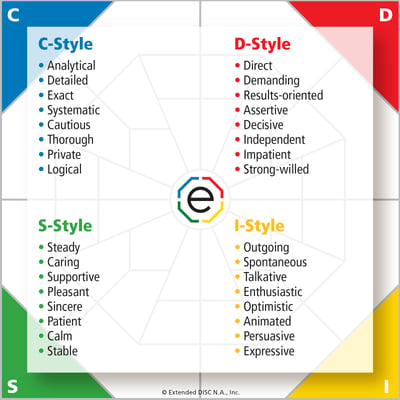DISC provides supportive feedback data to improve communication, teamwork, and leadership. It helps decode behavioral styles, manage conflicts, and foster personal growth.

The DISC model is a widely used behavioral assessment tool that helps individuals and organizations gain insights into preferred behavior and communication styles. It categorizes individuals into four primary behavioral styles: Dominance (D), Influence (I), Steadiness (S), and Conscientiousness (C). Understanding the benefits of DISC can be helpful in various personal and professional contexts:
- Improved Communication: DISC provides a common language to discuss and understand communication styles. By recognizing the preferences of different behavioral types, individuals can adapt their communication to be more effective and avoid misunderstandings.
- Enhanced Team Dynamics: When team members understand each other's DISC profiles, they can work more cohesively. Teams can capitalize on each member's strengths, mitigate conflicts, and allocate tasks based on individual preferences.
- Effective Leadership Development: DISC assessments aid in identifying leadership styles and potential areas for growth. Leaders can leverage this knowledge to adapt their management approach, motivate their team, and foster a positive work environment.
- Better Sales and Customer Service: Sales professionals can tailor their selling strategies to match the DISC style of their prospects, leading to more personalized and effective interactions. Similarly, customer service teams can provide better service by understanding and accommodating customers' communication preferences.
- Conflict Resolution: DISC insights can facilitate conflict resolution by highlighting the sources of tension and miscommunication between individuals. It enables parties to find common ground and work through disagreements more constructively.
- Effective Recruitment and Talent Management: Incorporating DISC assessments into the recruitment process can help match candidates to job roles that align with their natural behavioral tendencies. It also aids in identifying areas where coaching and training may be beneficial for professional growth.
- Improved Self-awareness: Individuals who take a DISC assessment often gain a deeper understanding of their behavioral tendencies, strengths, and areas for improvement. This self-awareness can lead to personal development and increased emotional intelligence.
- Stress Management: Recognizing one's stress triggers and learning how to adapt behavior in stressful situations can be valuable in reducing workplace stress and maintaining a healthier work-life balance.
- Team Building and Conflict Prevention: DISC workshops and training sessions can be effective in team building activities and conflict prevention initiatives. They create a positive and open environment where team members can learn and grow together.
- Personal and Professional Growth: DISC is a tool for continuous growth and development. By understanding how behavior impacts relationships and performance, individuals can proactively work on self-improvement.
It's important to note that while DISC assessments provide valuable insights, they are supportive feedback to better understand ourselves and others. The results should be considered alongside other factors and not used as the sole basis for decision-making.
Ready to learn more?

